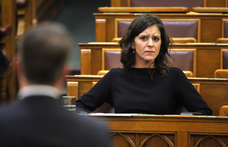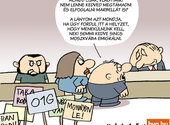"The word 'buy' is not to my taste. Let's say we grow together."
Wolfgang Ruttenstorfer, the 57-year-old chief executive of OMV, the Austrian oil company, is working to bring about a forced marriage between Hungary's Mol and his company. He believes the capital markets want a cash payment, which amounts to a buy-out. He dismisses suggestions that Russia's Gazprom is behind the plans.
HVG: I brought you an "I love Mol" sticker from a Hungarian filling station. Even the Vienna papers are reporting Hungarian calls to boycott Austrian companies. Were you expecting your purchase of 8.6 per cent of Mol's shares to kick up such a storm in Hungary?
W.R.: I don't think an emotional storm has a role to play in European economic development. OMV itself is no longer an Austrian company. Most of our activities are abroad, and we regard ourselves as a central European country headquartered in Vienna, which is also an international energy player.
HVG: Mol's board claims it was obvious even in the spring that OMV wanted to lay its hands on Mol's shares. Why did you make a hostile approach, without informing Mol's management?
W.R.: We've been discussing a cooperation agreement with Mol for years. We've been talking to Mr Hernadi for five years. Our discussions became more serious about a year ago, when we went as far as discussing share exchanges and swapping board members. But we didn't reach a solution, so when, in June, a large number of Mol shares came onto the market, we decided to buy it. We didn't intend this as a hostile manoeuvre; we just wanted to be present in the coming wave of consolidation with our 19 per cent shareholding. We wanted to act as a friendly partner, open to any kind of central European solution.
HVG: It's been reported that on the day you announced the share acquisitions, you sent a letter to Mol's management offering a full buy-out.
W.R.: In our letter, we called on Mol's directors to negotiate in the belief that we are in a process of consolidation.
HVG: Does consolidation imply further share acquisitions?
W.R.: Over the past six years, dozens of smaller energy companies have joined forces with larger companies in the region. This wave of acquisitions will continue over coming years, with the smaller companies becoming ever larger, and fewer companies remaining on the market. The remaining companies will be better capitalised and better able to invest. A combined Mol-OMV could be a powerful force in the region. Most analysts agree.
HVG: And after the events of the past weeks can you still imagine a merger, with two equal partners joining forces and exchanging shares?
W.R.: You have to bear in mind that the market is keenest on a cash offer. OMV would like to negotiate about the best possible combination. I'm convinced that the best experts have to be present in the management, whether they be Hungarian, Austrian or other Europeans. The company could have dual headquarters in Budapest and Vienna. That's what we've been discussing continuously for five years, and, for that matter, now. We want to gain an advantage, not weaken ourselves.
HVG: Mol's management worries that buying Mol removes OMV's most dangerous competitor from the market.
W.R.: Competition is regulated not by the Hungarian or Austrian authorities but by the EU. Brussels will examine whether there is any danger of a loss of competition. If Brussels decided that we had to sell certain activities for the merger to happen, this would not change the functioning of the company. I think an OMV-Mol tie-up would strengthen competition. It's good for the EU if companies can compete with giants like Shell or Agip.
HVG: While talking, OMV is continuing to look for Mol shares. Is it true that you want to make an offer to Mol by the end of September at the latest?
W.R.: I can neither confirm nor deny this, because we haven't taken a decision. That's just speculation. We're focusing on persuading Mol's management that we need to talk.
HVG: OMV has just set up an €13.5bn credit line, which implies you do want to buy Mol out…
W.R.: OMV is a very strong company, with major finance activities, with many different credit lines. And we don't comment on them.
HVG: Richard Schenz, your predecessor, said recently that if OMV were in Mol's place, it would be fighting tooth and nail to avoid being bought out. Do you disagree with him?
W.R.: I don't think you can talk in such general terms, because various kinds of mergers can be imagined. If Mol says a marriage would strengthen our position, then it will sit down and talk with us.
HVG: Mol and some Hungarian politicians say the acquisition attempt is not the problem. The real issue is that OMV is a state company beholden not to the market but serving state interests. Do you think there is a difference between the two types of ownership?
W.R.: There's no difference. Most of our shareholders are the same kinds of investment funds that own Mol. In both cases, the owners want to see the value of the company grow. And it's the same with the OIAG, the Austrian state holding company, which owns 49.1 per cent of OMV, or indeed IPIC, which represents Abu Dhabi. Neither fund interferes with our activities. To be honest, I'm surprised at Hungarian criticisms, since press reports suggest that the role of the state and politics in the business world is much larger than in Austria. It's also strange that the Hungarian state sold its holding in Mol and voted last year voted to sell its entire gas arm. The EU intervened, but there was no public outrage.
HVG: You've long been a proponent of our region's 'self-defence'? Who are you scared of? Gazprom?
W.R.: We aren't scared of anyone. We have clear strategic growth plans.
HVG: Gossip in Vienna holds that when the Russian president visited Austria in May, he gave his blessing to an OMV-Mol tie-up, only stipulating that the new company would have to sell its refinery in Bratislava. Is anything of this true?
W.R.: None of it is true. We don't ask for permission, and the Russians don't give their approval.
HVG: Yet there is also talk – even floated at a US congressional hearing and heard from the mouth of Basescu, the Romanian president – that OMV largely belongs to Gazprom, and that the Russian company is using OMV to get its hands on Mol.
W.R.: That's even more ridiculous. We look closely at our investors, and we know the names of most of the owners with holdings of more than 5 per cent, and Gazprom is not one of them.
HVG: Cooperation between OMV and Gazprom has grown closer recently. There's the joint construction of a gas storage silo in Baumgarten, for example.
W.R.: Austria was the first western country to sign a gas supply agreement with Russia, back in 1968, and they won't forget this. But our relationship is purely commercial. We are just buying the gas from them. We've always said that the region and the continent as a whole need an alternative to Russian gas.
HVG: And that's why OMV is involved in Iranian gas fields, regardless of the US's displeasure?
W.R.: We extract gas wherever we find it. The Caspian and the Middle East are two good sources.
HVG: If you can get hold of Iranian gas, then you'll have something to pour into the Nabucco pipeline which OMV supports. Do you think that the construction of that pipeline is going as smoothly now that Putin has diverted Caspian gas exports towards Russia?
W.R.: You have to think in decades in energy economics. Nabucco is a concrete and complex project involving five states and dozens of companies.
HVG: But look at the region again. What will happen if OMV can't buy Mol?
W.R.: I don't like the word 'buy'. I prefer to say we will grow together. I'm convinced that in two or three years' time we will find a mutually agreeable solution. There is no plan B!
ZSUZSA FÖLDVÁRI / Vienna
Oil pushes over $68
SINGAPORE, Jan 30 (Reuters) - Oil prices climbed more thanhalf a dollar to above $68 a barrel on Monday, shrugging off...

















